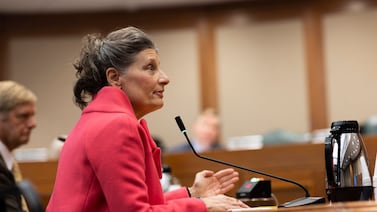Votebeat is a nonprofit news organization reporting on voting access and election administration across the U.S. Sign up for Votebeat Arizona’s free newsletter here.
Thousands of Arizona voters caught up in a state record-keeping error will lose at least some voting rights if they don’t prove their citizenship, despite a recent opinion from the state attorney general saying they should remain fully eligible to vote.
In Maricopa County, affected voters who don’t provide documentary proof of citizenship in time will be allowed to vote only in federal elections, according to public records obtained by Votebeat. And neighboring Pinal County will continue to suspend the registration of any voters affected by the error if they try to change their address or otherwise update their record without providing citizenship documentation, the county recorder’s office confirmed.
This means the disparate treatment of the affected voters based on where in the state they live will continue, even after Attorney General Kris Mayes issued an opinion in August aimed at resolving those disparities and creating a uniform policy statewide.
Secretary of State Adrian Fontes, a Democrat, had asked Mayes for the opinion after Votebeat reported in April about the differing treatment of voters. But attorney general opinions are not legally binding, and serve only as guidance.
After Mayes, also a Democrat, issued her opinion, Fontes’ office advised counties to follow it, but the responses in Maricopa and Pinal show that isn’t happening.
In other counties, affected voters will retain their full voting rights
The state error, announced last summer, involved a problem with Arizona Motor Vehicle Division records and affected roughly 200,000 longtime residents statewide. They were erroneously listed in state records as having provided proof of U.S. citizenship — which is required in Arizona to vote in state and local elections — even though they hadn’t done so, or been asked to.
Counties have been sending notices to affected voters in recent months to try to collect the citizenship documentation, but they took different approaches on how to do so, and what to do to voters who failed to provide it. Recorders across the state say that thousands of voters have provided documentation, but it’s unclear how many have not yet done so.
Mayes’ opinion said county recorders cannot legally suspend these voters’ registrations or move them to the federal-only voter roll simply because they fail to respond to these notices. Under state law, she wrote, recorders have to confirm that a voter is not a citizen before altering their voter registration status.
Some counties, such as Pima and Yavapai, have told Votebeat that they will follow the opinion and leave these voters eligible to vote a full ballot. Maricopa and Pinal, two of the largest counties, are so far the exceptions.
Responding to Maricopa’s and Pinal’s plans, Mayes spokesperson Richie Taylor told Votebeat that the office “will review the county’s positions and evaluate all of our options.”
Officials at local chapters of voting rights groups All Voting is Local and the League of Women Voters, who had commended Mayes’ opinion, said last week that it’s unacceptable for Maricopa and Pinal to choose a different path that will harm voters for an error that was outside of their control.
“Counties that choose to ignore this ruling are doing a disservice to voters, exposing themselves to costly litigation, and undermining confidence in the fairness of Arizona’s elections,” said Pinny Sheoran, state advocacy chair for the League of Women Voters of Arizona.
Secretary of State’s Office changes instructions after Mayes issues opinion
Fontes’ office initially told county recorders to move the affected voters to the federal-only list if they couldn’t get their citizenship proof from voters.
That’s the policy Maricopa County followed. The county recorder’s office had sent letters on June 27 to about 83,000 voters telling them that they were affected by the problem, and that they had 90 days to supply the citizenship proof. Ninety days from the date of the letter is Sept. 25, just before ballots go out for November jurisdictional elections.
When the attorney general’s opinion came out on Aug. 18, Fontes’ general counsel, Amy Chan, sent it to county recorders, according to an email obtained through a public records request, and told them to “please ensure your office aligns with this updated interpretation moving forward.”
The Maricopa County Recorder’s Office did not respond to multiple emails asking for clarity on the office’s plans now. But officials responding to a public-records request for more information said that the office hasn’t changed its messaging to voters since Mayes’ opinion came out, or sent any new letters to voters. That means that when an affected voter calls the office with a question, office staff is still directed to explain that they need to provide citizenship documentation “to remain a full ballot voter,” according to a document the county provided.
In Pinal County, Recorder Dana Lewis, a Republican, says she will not change voters’ status just because they don’t provide the documentation. But some voters there who are affected by the error are still at risk of losing their voting rights. For months, Lewis’ office has taken the position that if an affected voter tries to update their registration record, the office must suspend their registration until it receives proof of citizenship.
Pinal bases that policy on a state law that requires election officials to reject voter registration applications filed on a state form if they do not include proof of citizenship. Pinal County has interpreted that to include updates from registered voters — for changes of address, name, or party affiliation — along with new registrations, and has interpreted it to apply to the voters affected by the state error, if they make such a change.
Mayes’ opinion specifically said that law applies only to new registrants. Many of the affected voters have been voting for years or decades, it noted. “The idea of ‘rejecting’ their applications now would be like an employer ‘rejecting’ job applications of thousands of longtime employees,” Mayes wrote.
But after Mayes’ opinion came out, Pinal County reaffirmed its policy in a message on its website. Lisa James, a spokesperson for Lewis, confirmed to Votebeat that these voters who try to update their voter record will have their voting status set to “unregistered/not registered” pending proof of citizenship, and they will not be able to vote until they provide the citizenship proof.
“The AG’s opinion applies to those caught in the MVD glitch in their current status, not a change in registration,” James wrote.
Lewis has clarified that placing a voter in this status isn’t the same as cancelling a voter’s registration. If those voters show up at the polls, they will be permitted to vote, and have until 7 p.m. on Election Day to present citizenship document for their ballot to count.
Jen Fifield is a reporter for Votebeat based in Arizona. Contact Jen at jfifield@votebeat.org.



